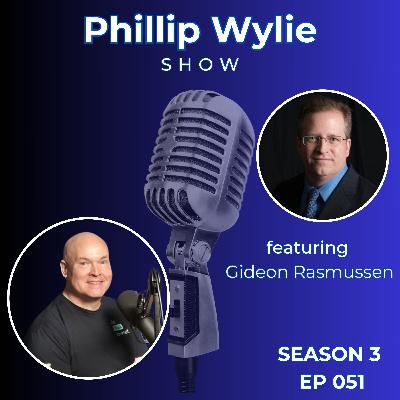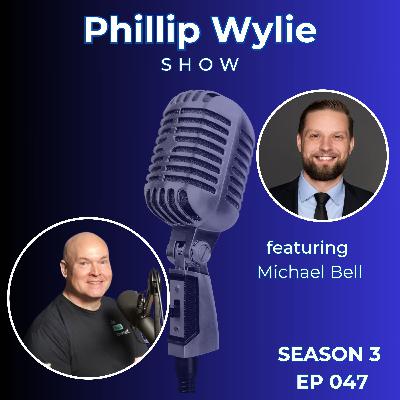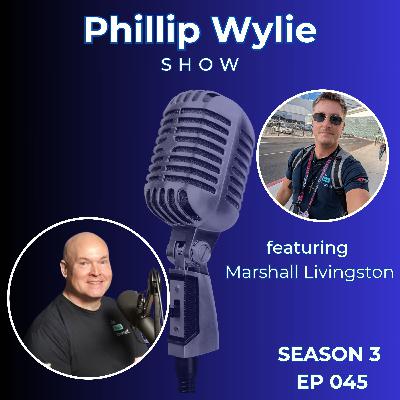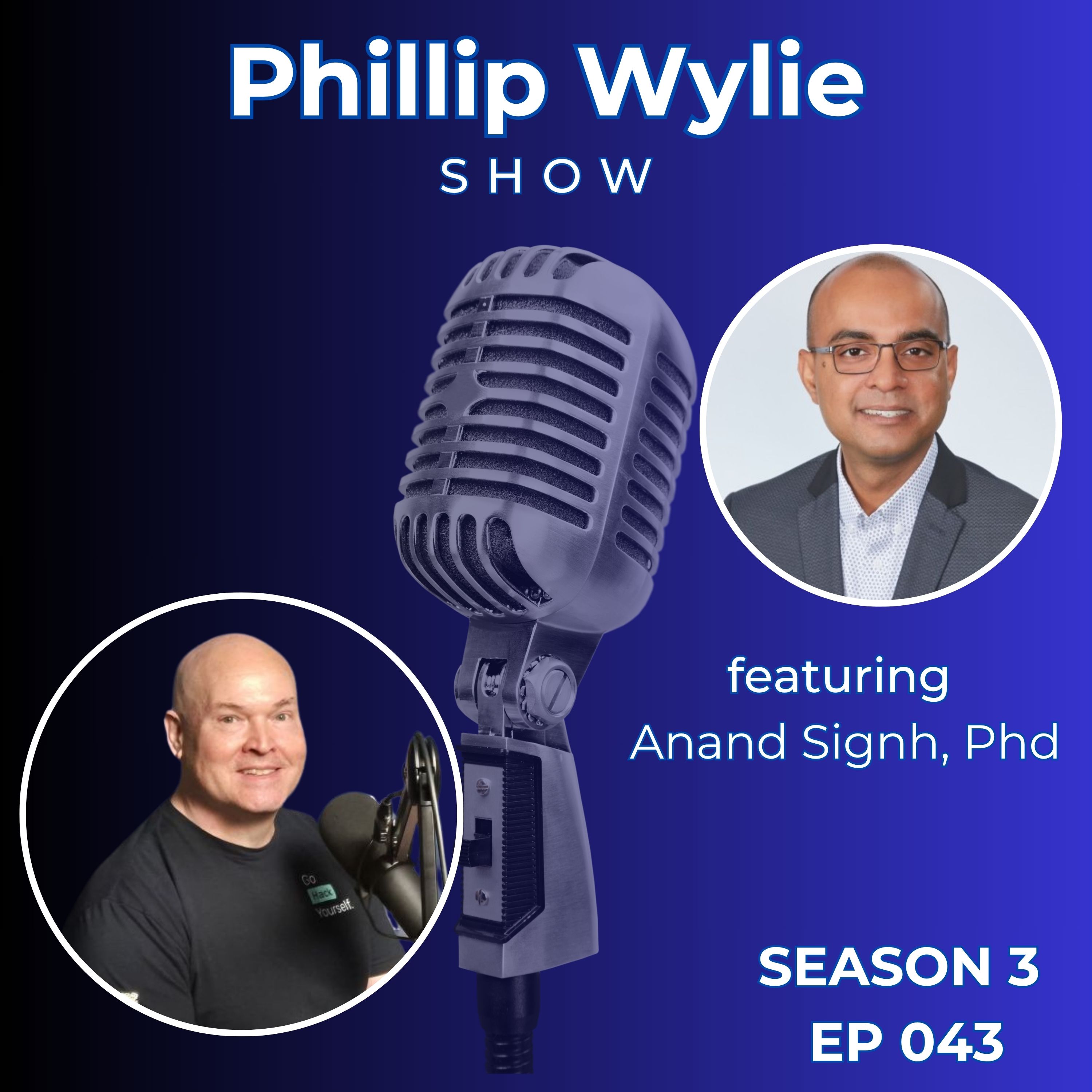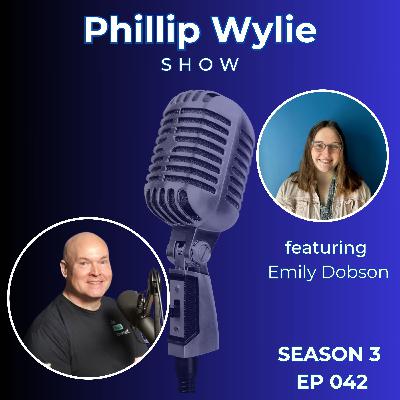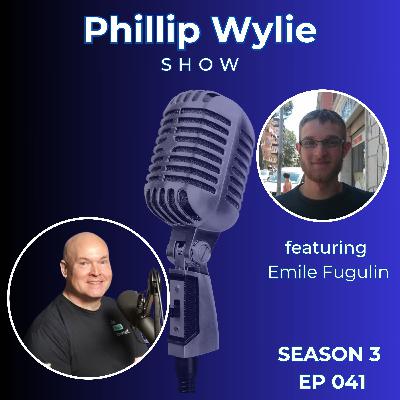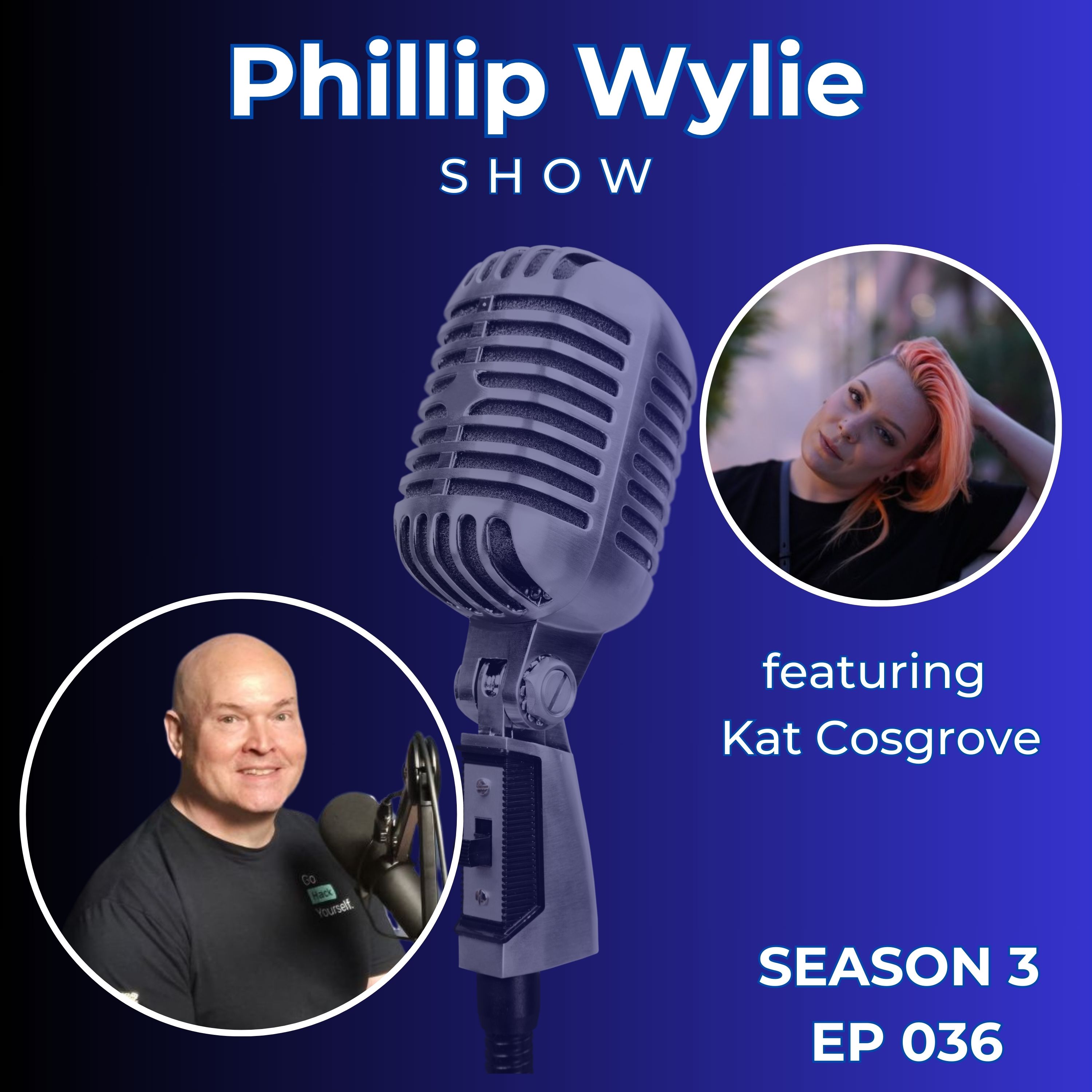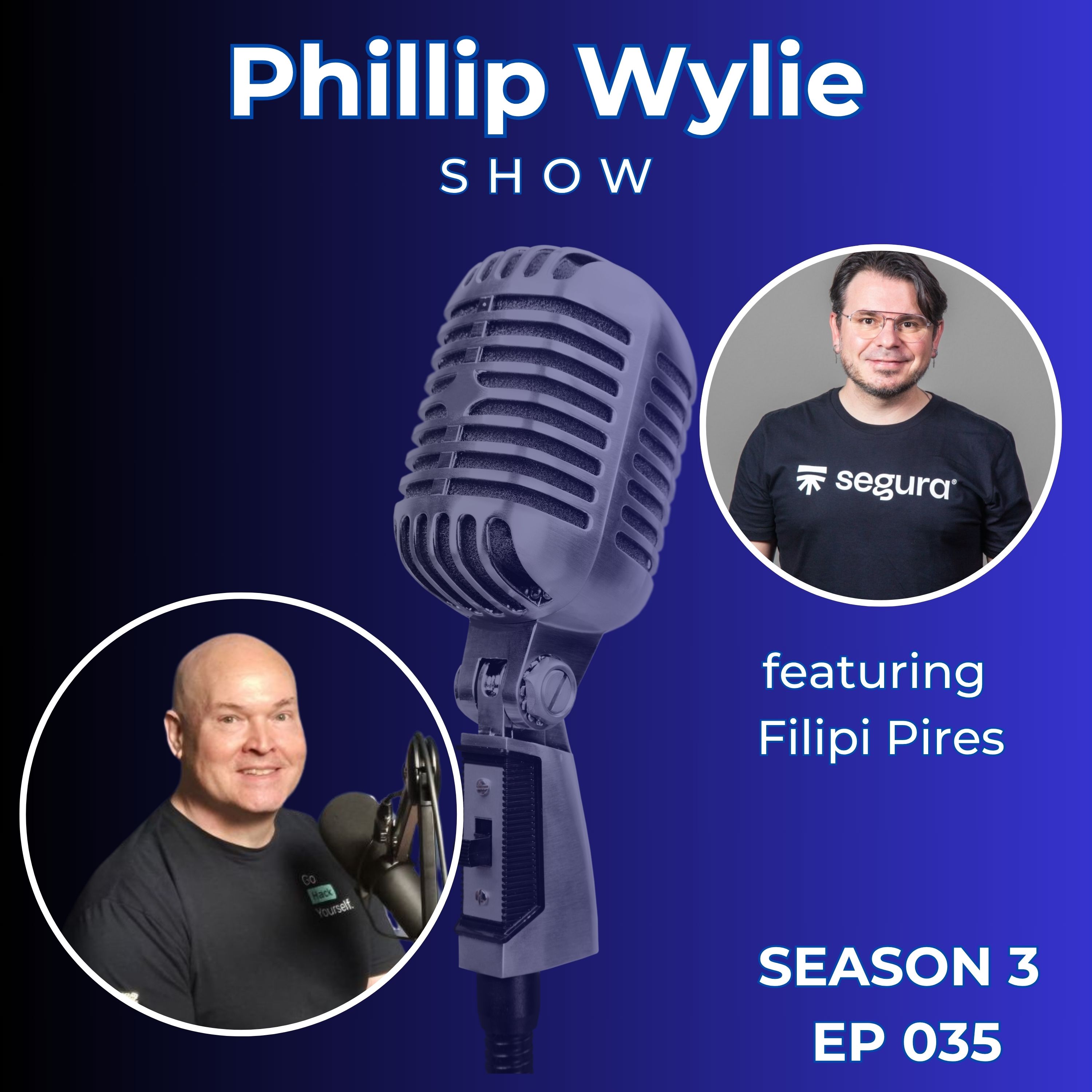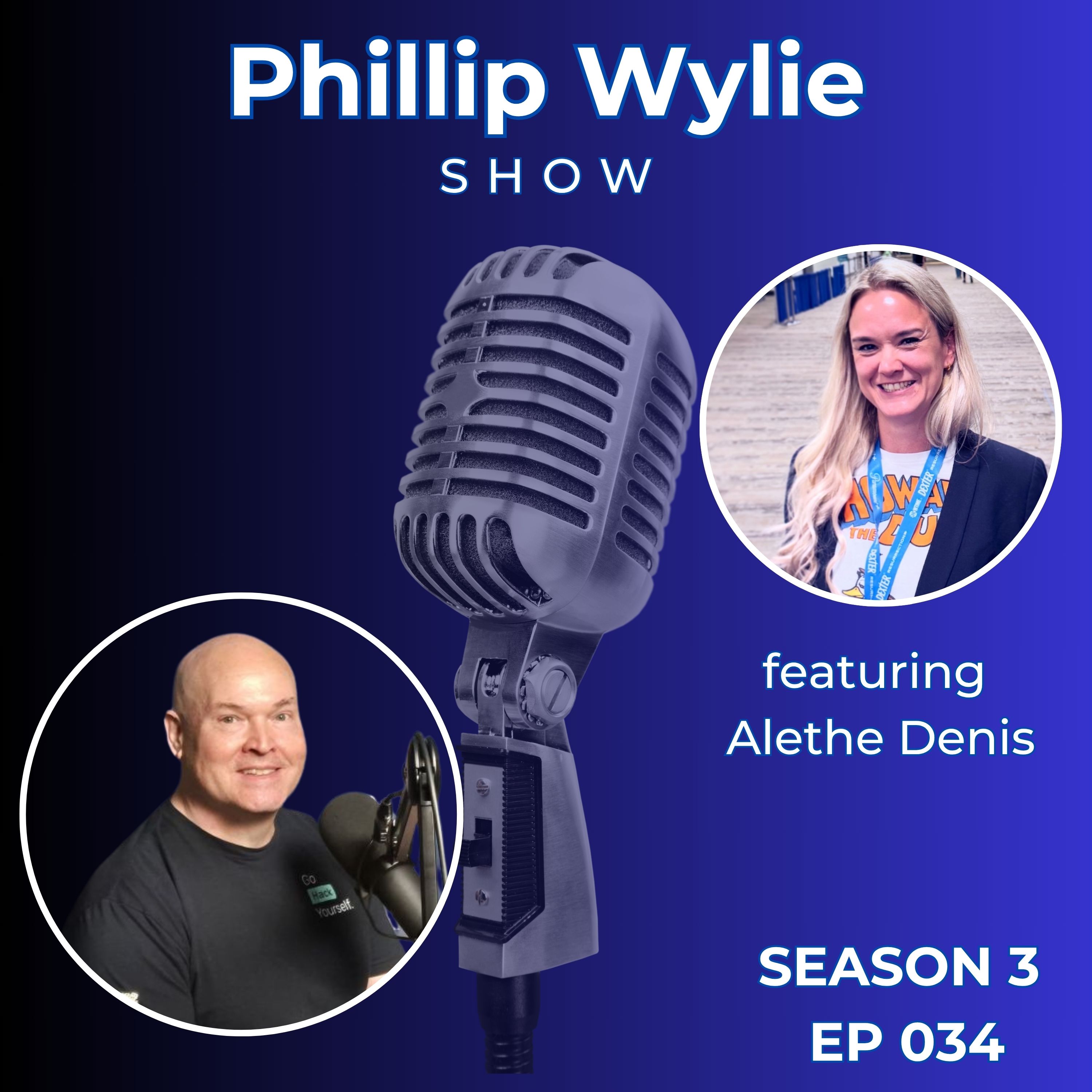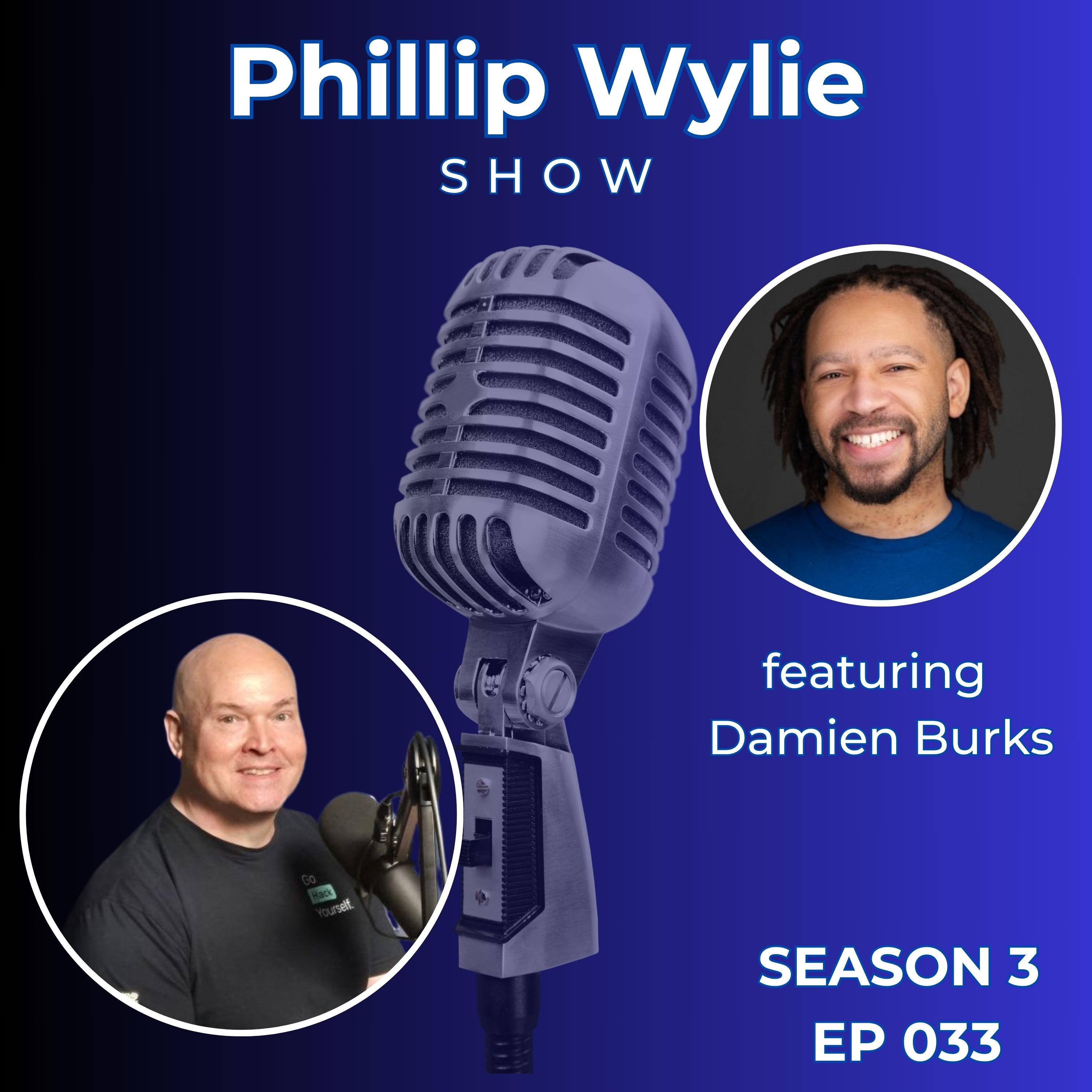Discover Phillip Wylie Show
Phillip Wylie Show

Phillip Wylie Show
Author: Phillip Wylie
Subscribed: 29Played: 1,245Subscribe
Share
© Phillip Wylie
Description
Join Phillip Wylie Show host Phillip Wylie as he and his guests discuss the intriguing and ever-expanding field of cybersecurity, including topics from the offensive security side to the defensive and response sides of cybersecurity. Frequent offensive security topics include pentesting, red teaming, ethical hacking, security research, and bug bounties. Guests share their origin stories, tips, and career advice. Phillip and his guests discuss content creation and personal branding in this podcast. If you enjoyed Phillip's previous podcast, The Hacker Factory, you will love this!
179 Episodes
Reverse
SummaryIn this episode of the Phillip Wylie Show, Phillip Wylie interviews Chris Glanden, a cybersecurity professional and podcaster. They discuss Chris's journey into cybersecurity, his experiences in podcasting, and his recent ventures into documentary filmmaking. The conversation also touches on public speaking, community engagement through events like the Lone Star Cyber Circus, and advice for aspiring podcasters. Chris shares insights on the importance of storytelling in cybersecurity and the impact of podcasts on listeners' lives.TakeawaysChris Glanden's journey into cybersecurity began after high school.He transitioned from IT to cybersecurity in 2011.Chris started his podcast during the pandemic in 2020.He has produced two documentaries focusing on cybersecurity themes.The Lone Star Cyber Circus is a community event Chris is passionate about.Public speaking was a challenge for Chris, but he has embraced it.Chris aims to create a conference for content creators in cybersecurity.He encourages aspiring podcasters to start with a clear purpose.Feedback from listeners motivates podcasters to continue their work.Community engagement is vital for personal and professional growth.Connect with Chris:https://www.linkedin.com/in/chrisglanden/https://pr0ph-1t.com/https://www.barcodesecurity.com/
SummaryIn this conversation, Gideon Rasmussen discusses the importance of understanding one's professional development areas and how to prepare for promotion. He emphasizes the need for individual contributors to demonstrate leadership and deliver solid performance over time to be considered for advancement.TakeawaysKnow what your areas of professional development are.Pursue your professional development actively.Prove yourself ready for promotion now.No one will provide a clear path to promotion.Write performance plans to guide your development.Run projects to showcase your skills.Demonstrate leadership even as an individual contributor.Aim for three to four years of solid performance.Deliver on projects consistently to advance.Seek feedback to improve your performance.Connect with Gideon:https://www.linkedin.com/in/gideonrasmussen/Gideon's book:Program Architecture: Fight the Good Fight (Security, Audit and Leadership Series) https://www.amazon.com/Program-Architecture-Fight-Security-Leadership/dp/1032896000
SummaryIn this conversation, Christopher Russell emphasizes the importance of being well-rounded in the field of cybersecurity. He discusses the necessity of understanding both offensive and defensive strategies, as well as the need for security professionals to grasp the business aspects of their roles. Russell highlights that a successful CISO must not only be technically proficient but also understand how security tools can support and enhance business operations.TakeawaysBeing well-rounded is essential in cybersecurity.A balance of offensive and defensive skills is necessary.Understanding various technologies is crucial.One must grasp how the business operates.An appetite for business knowledge is important.Security professionals should not just be cost centers.Enabling security tools can improve business areas.Tinkering and experimenting is part of the learning process.Thinking like a CISO involves business alignment.Collaboration between security and business is key.Connect with Christopher:https://www.linkedin.com/in/christopher-russell-5a9b20a7/
SummaryIn this episode of the Philip Wylie Show, host Phillip Wylie speaks with Ted Harrington, a fellow podcaster and author, about the hacker mindset and its implications in cybersecurity. They discuss the misconceptions surrounding hackers, the importance of curiosity and creativity, and how the hacker mindset can be applied beyond technology. Ted shares his personal journey into the world of hacking, the motivation behind his new book, and offers insights on building a personal brand in the cybersecurity field. The conversation concludes with a message of optimism regarding the future of cybersecurity and the role of hackers in creating a safer digital world.TakeawaysThe hacker mindset is about curiosity and creativity.Not all hackers are malicious; many are ethical.It's never too late to pivot into cybersecurity.The hacker mindset can be applied to various fields, not just tech.Building a personal brand requires authenticity and consistency.Helping others should be the primary goal of content creation.The hacker community is diverse and includes many positive contributors.Innovation and disruption are key aspects of the hacker mindset.Ted's journey illustrates that anyone can become a hacker.Optimism is essential in the face of cybersecurity challenges.Connect with Ted:https://www.tedharrington.com/https://www.linkedin.com/in/securityted/https://www.amazon.com/Inner-Hacker-New-Way-Thinking-ebook/dp/B0FQR1SWWHChapters00:00 Introduction to the Hacker Mindset04:09 Ted Harrington's Hacker Origin Story11:27 The Inspiration Behind 'Inner Hacker'16:42 Defining the Hacker Mindset20:12 Building a Personal Brand in Cybersecurity26:46 Optimism in the Security Profession
SummaryIn this episode of the Philip Wylie Show, Bat shares her journey from a childhood fascination with computers to a career in cybersecurity, specifically in threat hunting. Bat discusses her early experiences with hacking, the transition from wanting to be a pen tester to discovering a passion for digital forensics, and the day-to-day responsibilities of a threat hunter. The conversation also touches on the importance of education, certifications, and the evolving role of AI in cybersecurity.TakeawaysBat emphasizes the importance of privacy in their work.The journey into hacking often starts from a young age.Career paths in cybersecurity can vary widely.Exploring different disciplines can lead to fulfilling careers.Threat hunting involves a lot of research and documentation.AI is becoming more integrated into cybersecurity roles.Hands-on experience is crucial for success in threat hunting.Certifications can be beneficial but are not always necessary.Education in cybersecurity can be outdated and expensive.Defensive security roles are essential for protecting systems.Connect with Bat:https://x.com/batloggedChapters00:00 Introduction to the Guest and Their Background01:29 Bat's Hacker Origin Story05:14 Career Path and Transition to Cybersecurity10:14 Exploring Different Areas in Cybersecurity12:24 Day-to-Day in Threat Hunting17:49 Leveraging AI in Threat Hunting19:28 Training and Experience for Threat Hunting21:32 The Importance of Building Narratives in Security24:07 Certifications and Their Value27:12 The Value of Formal Education vs. Self-Study29:06 Closing Thoughts on Defensive Security
AI Won't Take Your Job - If You Learn This | Cybersecurity & Employment in the AI EraIs AI going to take your job? In this essential episode, Phillip Wylie sits down with Michael Bell, CEO and Co-founder of Suzu Labs, to dive deep into the intersection of artificial intelligence, employment security, and the future of cybersecurity. Learn why adapting to AI is crucial for your career survival and discover how to make yourself invaluable in an AI-driven workforce. From Suzu Labs' cutting-edge services to practical advice for aspiring cybersecurity professionals, Michael shares everything you need to know about thriving alongside AI technology.Whether you're a seasoned professional worried about job displacement or someone looking to break into cybersecurity, this conversation provides actionable strategies for integrating AI into your skill set and future-proofing your career.🎯 KEY TAKEAWAYS✅ AI is a tool for enhancement, not replacement✅ Focus on making yourself invaluable by integrating AI skills✅ Continuous learning is non-negotiable in the AI age✅ Human creativity and critical thinking remain irreplaceable✅ New opportunities emerge as technology evolves✅ Collaboration with AI > Competition against AI✅ Adaptability is your greatest asset✅ The future belongs to those who embrace changeConnect with Michael and Suzu Labs:https://www.linkedin.com/in/artificial-mike/https://www.linkedin.com/company/suzu-labs/https://suzulabs.com/Chapters00:00 Introduction to AI and Cybersecurity04:06 Overview of SUSE Labs and Its Services10:01 The Impact of AI on Cybersecurity14:35 The Future of Offensive Security20:19 AI's Role in Job Security23:10 The Importance of the Human Element in AI25:04 Advice for Aspiring Cybersecurity Professionals26:56 Starting Your Own Business in Cybersecurity30:06 Phillip Wylie Show Outro Video.mp4
SummaryIn this conversation, Victoria Mosby emphasizes the importance of overcoming self-doubt and embracing new ideas. She encourages listeners to take risks and not let insecurities hold them back from pursuing opportunities for growth and learning.TakeawaysDon't let it talk, don't let yourself talk yourself out of a good idea.It's the fact that you tried it and this goes out to a coworker who you know it's insecurity.Embrace the possibility of failure as a learning opportunity.Reach out to others to learn more, despite insecurities.Taking risks can lead to personal and professional growth.Insecurity shouldn't prevent you from pursuing your interests.Trying new things is more valuable than the outcome.Encouragement can help others overcome their doubts.Learning is a continuous journey, not a destination.Support each other in overcoming self-doubt.Connect with Victoria:https://www.linkedin.com/in/victoria-mosby/https://www.victoriamosby.com/Chapters00:00 Introduction and Background01:52 Victoria's Hacker Origin Story04:51 The Importance of Networking07:36 Balancing Work and Personal Life10:06 The Role of AI in Policy Writing11:37 Compliance and Its Impact on Security Roles13:53 Getting into Policy Work16:44 Understanding the Sales Engineer Role19:53 Skills and Experience for Sales Engineers22:06 Breaking into Sales Engineering25:47 Overcoming Imposter Syndrome29:05 Phillip Wylie Show Outro Video.mp4
SummaryIn this episode of the Philip Wylie Show, host Phillip Wylie interviews Marshall Livingston, who shares his journey from the restaurant industry to cybersecurity. They discuss the importance of coding in cybersecurity, the impact of AI on the industry, and how it can be leveraged for business opportunities. Marshall also talks about the role of sales engineering as a career path and his current ventures in creating engaging cybersecurity training solutions. The conversation emphasizes the need for understanding AI and its implications for job automation and decision-making in the tech industry.Connect with Marshall!https://www.linkedin.com/in/marshall-livingston-007031337/Chapters00:00 Introduction and Guest Background01:09 Marshall's Hacker Origin Story04:17 The Role of Coding in Cybersecurity06:26 AI's Impact on Cybersecurity and Coding10:12 Leveraging AI for Business Opportunities12:05 Market Analysis and AI Trends15:39 The Importance of Understanding AI17:29 AI's Role in Decision Making21:28 Job Automation and AI's Impact on Employment23:54 Sales Engineering as a Career Path26:44 Marshall's Current Ventures and Future Plans
SummaryIn this episode of the Philip Wylie Show, Edna Jonsson shares her journey into cybersecurity, detailing her transition from coding to becoming a SOC analyst. She discusses the importance of education, certifications, and self-study, as well as the value of community and networking in the field. Edna also highlights her podcast aimed at helping newcomers to cybersecurity and encourages listeners to engage with their local cybersecurity communities.Takeaways• Edna's journey into cybersecurity began with coding and attending DEF CON.• Working in a SOC involves monitoring alerts and understanding security events.• Certifications like Security Plus and CYSA+ are beneficial for breaking into cybersecurity.• Self-study and continuous learning are crucial in the ever-evolving field of cybersecurity.• Networking and community involvement can significantly enhance career opportunities.• Edna emphasizes the importance of hands-on experience and participating in CTFs.• Volunteering at cybersecurity events can lead to valuable connections and learning opportunities.• Having a degree is not mandatory, but it can help in job applications.• Edna's podcast aims to support newcomers in their cybersecurity careers.• Resource sharing is a vital part of contributing to the cybersecurity community.Connect with Edna! https://www.linkedin.com/in/ednajonsson/https://www.youtube.com/ @EdnaJonsson Chapters00:00 Introduction to Cybersecurity Journey02:55 Edna's Hacker Origin Story05:23 Understanding the SOC Role07:46 Career Pathways from SOC10:20 Degrees and Certifications in Cybersecurity12:54 The Importance of Self-Study15:50 Community Engagement in Cybersecurity18:21 Launching the Security Chipmunks Podcast20:55 Networking and Community Building
SummaryJoin Phillip Wylie as he interviews Anand Singh about his new book on AI security and the critical intersection of data protection, cybersecurity, and artificial intelligence. Anand shares his journey from working on Cray supercomputers to becoming a cybersecurity leader, and provides practical frameworks for organizations adopting AI securely.TakeawaysAI can be a useful tool for individuals.Malicious actors also leverage AI for attacks.It's crucial to secure the use of AI.AI is transforming security tooling.Understanding AI's dual nature is essential.Security for AI and AI for security are interconnected.The landscape of AI includes both benefits and risks.Organizations must be proactive in AI security.AI's potential for misuse is a growing concern.Cybersecurity strategies must evolve with AI advancements.Sound bites"AI is a very useful tool for individuals.""How are you securing your use of AI?""AI for security is becoming more important."Chapters00:00 Introduction to Anand Singh and His Book07:01 Anand's Hacker Origin Story12:30 The Importance of AI in Cybersecurity20:15 Risks of AI and Data Security25:04 Implementing AI Securely in Organizations28:02 AI vs Machine Learning and Final Thoughts29:49 Phillip Wylie Show Outro VideoConnect with Anand and get his book! https://www.linkedin.com/in/anandsinghmn/https://www.amazon.com/Data-Security-Age-Protecting-AI-Driven/dp/1968433015/My interview with Anand for the Phosphorus IoT Security Podcast:https://phosphorus.io/securing-the-foundation-cyber-strategy-in-the-age-of-smart-infrastructure-with-global-ciso-anand-singh/
SummaryIn this episode of the Phillip Wylie Show, Emily Dobson shares her journey into cybersecurity, influenced by her family's background in technology. She discusses her experiences in digital forensics, the importance of networking, and her role in organizing conferences. Emily emphasizes the value of certifications and soft skills in the industry, as well as the significance of public speaking. The conversation concludes with her advice for newcomers in cybersecurity and her future aspirations in the field.TakeawaysEmily's interest in cybersecurity was sparked by her father's career.Networking is crucial for breaking into the cybersecurity field.Running conferences has helped Emily build valuable connections.Certifications can provide an edge in the job market.Soft skills are often as important as technical skills in cybersecurity.Public speaking can significantly enhance one's career opportunities.There are various career paths in cybersecurity beyond penetration testing.GRC roles are often overlooked but offer great starting points.Emily encourages newcomers to speak at conferences to gain experience.The importance of passion in choosing topics for presentations.Connect with Emily! https://www.linkedin.com/in/emily-dobson-cyber-technology/Chapters00:00 Introduction and Background03:23 Emily's Journey into Cybersecurity06:08 The Importance of Networking08:47 Running Conferences and Building Connections11:50 The Role of Certifications in Cybersecurity14:27 Exploring Career Paths in Cybersecurity17:27 Soft Skills in Cybersecurity20:10 Public Speaking and Overcoming Fears22:52 Future Aspirations and Closing Thoughts
SummaryIn this episode of the Phillip Wylie Show, Emile Fugulin, co-founder of Caido, discusses the evolution of cybersecurity tools, his personal journey into hacking, and the importance of community engagement in the bug bounty space. He highlights the performance challenges faced by traditional security tools and how Caido aims to address these issues through innovative design and architecture. Emile also shares insights on the integration of AI in cybersecurity, the learning curve for new users, and the future of automation in the industry.TakeawaysEmile Fugulin emphasizes the importance of competition in the cybersecurity tool market.Caido aims to improve performance and usability compared to traditional tools.The tool is designed to facilitate collaboration between hackers and developers.Caido's architecture allows for remote deployment, enhancing flexibility for users.Community engagement is crucial for Caido's development, especially in plugin creation.The bug bounty community has been a primary focus for Caido's growth and features.Efficiency in manual testing is a key consideration in Caido's design.The learning curve for Caido is designed to be less steep than traditional tools.AI integration is being approached with user control and privacy in mind.The future of cybersecurity will likely see increased automation, but human intuition remains essential.Connect with Emile!https://www.linkedin.com/in/efugulin/https://caido.io/Chapters00:00 Introduction to Caido and Emil's Background03:19 Emil's Hacker Origin Story06:05 Performance and Usability Challenges in Security Tools09:35 Caido's Technical Architecture and Community Engagement12:11 Plugin Development and Community Contributions14:14 Focus on Bug Bounty Community15:34 The Role of Automation in Pen Testing18:05 Learning Curve and Documentation for Caido21:35 AI Integration and Future of Pen Testing24:39 The Future of Cybersecurity Jobs26:51 Closing Remarks and Community Engagement
SummaryIn this episode of the Phillip Wylie Show, host Phillip Wylie interviews Lisa Landau, a cybersecurity expert and co-founder of Threat Light. They discuss Lisa's unique journey from military intelligence to the startup world, the challenges and opportunities in cybersecurity, and the importance of hiring talent with diverse backgrounds. Lisa shares insights on how to break into the cybersecurity field, the significance of passion and critical thinking in candidates, and her vision for making cybersecurity solutions more accessible. The conversation culminates in an exploration of the founding of Threat Light and its mission to provide effective incident response solutions.TakeawaysLisa Landau emphasizes the importance of diverse experiences in cybersecurity.Working in startups allows individuals to wear many hats and gain varied skills.Hiring managers should consider potential over specific past experience.Passion for cybersecurity is crucial for success in the field.Critical thinking and the ability to work under pressure are essential traits.Cybersecurity roles often require a mindset that goes beyond a 9-to-5 job.The startup environment can be daunting but offers unique learning opportunities.Threat Light aims to make enterprise-level security accessible to all.Incident response requires speed and efficiency to mitigate risks.Hiring managers should be open-minded to candidates from non-traditional backgrounds.Connect with Lisa!http://linkedin.com/in/lisa-landau/https://www.linkedin.com/company/threatlight/https://www.threatlight.comChapters00:00 Introduction and Background03:09 Lisa's Origin Story in Cybersecurity08:46 Transitioning from Corporate to Startup Life11:33 Opportunities for New Graduates in Startups20:31 Hiring Strategies for Cybersecurity Talent23:23 The Birth of ThreatLight and Its Mission
SummaryIn this episode of the Phillip Wylie Show, John Baker from MITRE discusses the organization's role in cybersecurity, including the development of the ATT&CK framework and the importance of threat intelligence. He shares his personal journey into the field, MITRE's structure as a nonprofit, and the evolution of their resources. The conversation also touches on the integration of AI in cybersecurity, the significance of CVEs, and the need for continuous learning in the ever-evolving landscape of cyber threats.Connect with Jon! https://www.linkedin.com/in/jonathanobaker/MITREhttps://www.mitre.org/focus-areas/cybersecurity/threat-informed-defenseChapters00:00 Introduction to MITRE and Cybersecurity Resources03:16 John Baker's Hacker Origin Story06:34 Understanding MITRE's Role and Structure08:18 Exploring MITRE's Initiatives and Projects11:04 The Development of MITRE ATT&CK15:13 The Importance of Cyber Threat Intelligence17:21 Center for Threat-Informed Defense20:11 Leveraging AI in Cybersecurity23:35 The Role of CVEs in Vulnerability Management29:36 Closing Thoughts on Cybersecurity Learning
SummaryIn this episode of the Phillip Wylie Show, host Phillip Wylie speaks with Casey Camilleri about the evolution of offensive security, the importance of continuous penetration testing, and the role of automation and AI in the cybersecurity landscape. They discuss Casey's hacker origin story, the shift in mindset required for modern security practices, and provide advice for aspiring penetration testers. The conversation emphasizes the need for continuous learning and adaptation in the ever-changing field of cybersecurity.Connect with Casey!https://www.linkedin.com/in/caseycammilleri/https://www.sprocketsecurity.com/Chapters00:00 Introduction and Equipment Enthusiasm02:12 The Hacker Origin Story05:03 Evolution of Penetration Testing07:33 Continuous Penetration Testing and Automation10:29 The Role of AI in Pen Testing13:03 Challenges in Application Pen Testing15:37 Mindset Shift in Cybersecurity18:31 Advice for Aspiring Pen Testers21:21 Closing Thoughts on Continuous Security
SummaryIn this episode of the Phillip Wylie Show, Jennifer Leggio shares her insights on personal branding, the evolution of marketing in cybersecurity, and the importance of community engagement. With a rich background in cybersecurity marketing, Jennifer discusses her journey from journalism to becoming a key player in the cybersecurity community. She emphasizes the need for marketers to understand the technical aspects of their products and the significance of authentic content creation. The conversation also touches on resilience in the face of career challenges and the importance of mental health in the industry.Chapters00:00 Introduction and Personal Branding04:02 Jennifer Leggio's Origin Story06:58 Building Personal Brands10:09 The Importance of Technical Understanding in Marketing13:04 Evolution of Marketing in Cybersecurity15:53 Content Creation and Its Value18:53 Influencer Marketing and Subject Matter Expertise22:01 The Challenges of Faking Expertise25:06 Resilience in Cybersecurity Careers28:09 Mental Health and Personal Growth31:00 Closing Thoughts and Community SupportConnect with Jennifer!https://www.linkedin.com/in/jenniferleggio/https://x.com/mediaphyter
Summary In this episode of the Phillip Wylie Show, host Phillip Wylie speaks with Kat Cozgrove, a developer advocate and Kubernetes maintainer. They discuss Kat's journey into technology, her hacker origin story, and her transition from software engineering to developer advocacy. Kat shares insights on getting started with Kubernetes, the importance of open source contributions, and the value of networking and community engagement. They also touch on misconceptions about sales roles, the benefits of attending smaller conferences, and the significance of kindness in the open source community.Chapters00:00 Introduction 04:03 Kat's Hacker Origin Story06:59 Career Path in Technology09:50 Transition to Developer Advocacy13:00 Getting Started with Kubernetes15:52 The Importance of Community and Networking19:04 Career Evolution and Opportunities22:07 The Value of Learning to Code25:09 Exploring Non-Traditional Career Paths28:10 The Role of Sales in Tech31:08 Conferences and Community Engagement33:51 Closing Thoughts and Open Source AdvocacyConnect with Kat!https://www.linkedin.com/in/katcosgrove/https://bsky.app/profile/kat.lol
**"In this inspiring cybersecurity conversation, Filipi Pires reflects on his decade-long journey in the industry, sharing lessons on patience, persistence, and embracing your personal career path. He discusses the realities of professional growth, the importance of continuous learning, and why comparing yourself to others can hold you back. Perfect for aspiring ethical hackers, penetration testers, and anyone navigating the cybersecurity career landscape."**Timestamps:00:00 Introduction02:15 Filipi’s career beginnings07:40 Lessons from a decade in cybersecurity12:30 The importance of patience and persistence17:55 Overcoming self-comparison23:10 Career advice for aspiring professionalsConnect with Filipi Pires:🔗 LinkedIn: https://www.linkedin.com/in/filipipires/🔗 Twitter/X: https://x.com/FilipiPiresFollow The Phillip Wylie Show:🎙 Podcast: https://phillipwylieshow.com📺 YouTube: https://www.youtube.com/c/phillipwylie🔗 Website: https://thehackermaker.com
SummaryIn this episode of the Phillip Wylie Show, Phillip Wylie interviews Alethe Denis from Bishop Fox, exploring her journey into hacking, the significance of social engineering in cybersecurity, and the evolving landscape of phishing and red teaming. Alethe shares her unique origin story, insights into the importance of real phishing engagements, and creative methods for gaining access during physical pen tests. The conversation also touches on the ethical implications of social engineering, the challenges posed by increasing security awareness, and valuable advice for aspiring security professionals.TakeawaysAlethe's journey into hacking began with an interest in social engineering as a child.The evolution of hacking has always involved human manipulation.Real phishing engagements provide a more accurate assessment of security posture.Red teaming is essential for testing security assumptions and controls.Physical pen testing requires creative strategies to gain access.Voice phishing techniques are becoming increasingly sophisticated.Security awareness training is improving, but challenges remain.Ethical considerations are crucial in social engineering practices.AI is being misused to create fake explicit images for extortion.Networking and community engagement are vital for career growth in cybersecurity.Connect with Alethe! https://www.linkedin.com/in/alethe/https://alethedenis.com/Chapters00:00 Introduction and Background02:29 Alethe's Hacker Origin Story06:40 The Evolution of Hacking and Social Engineering08:11 Role of Social Engineering in Red Teaming10:23 The Importance of Realistic Phishing Engagements13:42 Physical Pen Testing and Access Strategies16:15 Creative Methods for Gaining Access20:03 Voice Phishing Techniques and Challenges22:56 Navigating Social Engineering and Security Awareness28:02 The Evolution of Scams and Manipulation Techniques32:43 Career Pathways in Cybersecurity40:31 Balancing Offensive and Defensive Security Roles
SummaryIn this episode, Phillip Wylie interviews Damien Burks, who shares his journey from aspiring video game developer to a successful career in cybersecurity and cloud technologies. Damien discusses his hacker origin story, the importance of cloud computing, and the differences between major cloud service providers like AWS, Google Cloud, and Azure. He emphasizes the significance of scripting languages, particularly Python, in cloud engineering and offers advice for those looking to enter the field. Additionally, Damien talks about his community-building efforts through the DevSec Blueprint and the impact of content creation on his career.TakeawaysDamien started his journey in cybersecurity through a college club.He emphasizes the importance of cloud technologies in modern IT.AWS is seen as a more mature cloud provider compared to others.Scripting, especially in Python, is crucial for cloud engineering.Content creation can significantly enhance career opportunities.The DevSec Blueprint aims to guide aspiring DevSecOps professionals.Community engagement is vital for learning and growth in tech.Damien encourages starting content creation with what feels comfortable.Google Cloud is praised for its user-friendly interface.Continuous learning and certification are essential in tech careers.Connect with Damien Burks:LinkedIn: https://www.linkedin.com/in/damienjburks/X/Twitter: https://x.com/damienjburksDevSec Blueprint: https://www.devsecblueprint.com/YouTube: https://www.youtube.com/@damienjburks



